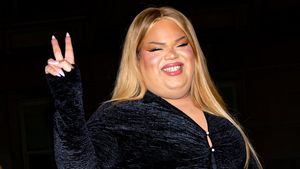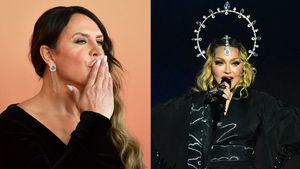In an age when
most media portrayals of LGBT life still focus on gay
white men, an event like Outfest's Fusion Film
Festival isn't just
important--it's necessary. Now in its fifth
year, the Los Angeles-based festival (which ran from
November 30 to December 2) shines its spotlight on
queer people of color, providing a forum for diverse films,
documentaries, and shorts from around the world.
Jock Soto, the
subject of Gwendolen Cates' documentary Water
Flowing Together (which won the festival's
Best Feature Award), is the perfect Fusion protagonist: gay,
Navajo Indian, and Puerto Rican. At just 16-years-old,
Soto was personally selected by George Balanchine to
become a member of the New York City Ballet's
corps de ballet; now, after 25 years with the company, he
prepares to retire from the only career he's ever
known. Soto is a charming, handsome subject, and
though Cates prods him into an awkward trip to the
reservation he left behind as a teenager, there are no teary
confessionals to be had here. Instead, the film acts as a
circumspect tribute to Soto's hard work and
endurance, and though it touches all-too-briefly on
the issues of his mixed heritage and sexuality
(Soto's partner isn't even glimpsed
until the end credits begin to roll), it effectively
conveys the rigor of professional dance.
Above: Water
Flowing Together
The screening of
In the Fire (En El Fuego), which took the
festival's Best Documentary Short award, was preceded
by a minor dust-up when a Peruvian audience member
took director Dante Alencastre to task for filming in
the shantytowns of her home country. She was worried
that the ensuing portrait would paint a negative picture
of Peru--and in some respects she was right as
Alencastre does not sugarcoat the country's
cruel, backwards treatment of its transgender women.
Still, there is much here to inspire, and it comes from the
strong trans women Alencastre interviews, who are
working hard to change the hearts and minds of their
fellow countrymen. One attempts to seek justice for
abused trans sex workers, while another puts on plays for
children that teach lessons about tolerance, and a
third is a talented engineer who harbors an ambition
to run for Congress.
While In the
Fire excels by selecting fascinating people to
interview, Daughters of Chiquita can find too
few. The documentary purports to be about
Chiquita's Party, an annual event in Belem, Brazil
that acts as a campy offshoot of the procession of Our
Lady of Nazareth, a religious ceremony that draws
millions. Really, though, the subject is just a jumping-off
point to explore the attitudes of a dozen or so Brazilians
toward homosexuality. There are plenty of amusing gay
men to meet (one drag queen recounts how destroyed he
was when his outrageous costume earned him nary a gay
slur), but the homophobes are all easy targets.
Though Love My
Life is adapted from a Japanese manga, it feels
like it could have first been a pop song--it's
that sweet, fun, and cute. When college student Ichiko comes
out to her father, he's got a surprise for her:
he's gay, too, and so was Ichiko's late
mother. In fact, almost everyone in Ichiko's life is gay or
lesbian, including Ichiko's studious
girlfriend, her dad's younger boyfriend, her
nerdy best friend, and the punky girl who Ichiko nurses a
secret crush on. Though the characters all wrestle in
some way with the idea of coming out
publicly--giving the film its nominal
theme--this is a sweet-natured fantasy at heart,
one where the parents are cool, the haircuts are hip,
and the romances are as sweet as cotton candy.
The relationships
in Don't Go are considerably more
fraught--each of its main characters has a tricky
lover or family member that they can't seem to
shake. Conceived by director Amber Sharp as a
television drama pilot, the project has been making the
gay festival rounds as Sharp attempts to find it a home, and
there's certainly promise in its intent to be
an LGBT Melrose Place (especially one that features a
cast made up predominantly of people of color). Still,
there's only one plotline that makes good on
its milieu--a surprise pregnancy that pivots on
an intersexed twist--while the rest play their soapy
storylines out in far too earnest a fashion. Perhaps
Sharp should take a cue from her biggest influence and
add a Heather Locklear character to mix things
up--or lend the tense, terrific Guinevere Turner (this
cast's biggest pro) a pair of claws.



















































































